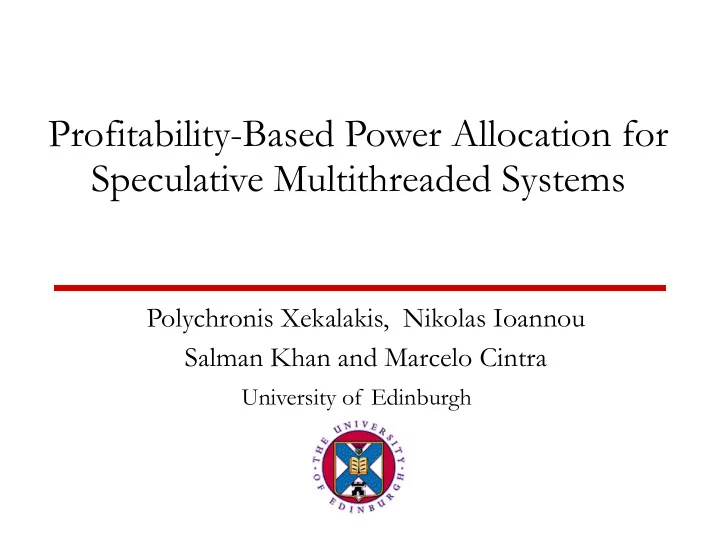

Profitability-Based Power Allocation for Speculative Multithreaded Systems Polychronis Xekalakis, Nikolas Ioannou Salman Khan and Marcelo Cintra University of Edinburgh
Introduction CMPs are here to stay Power and temperature limit performance No speedup for single thread applications – Use Thread Level Speculation to extract TLP – Energy Inefficient IPDPS 2010 2
Introduction CMPs are here to stay Power and temperature limit performance No speedup for single thread applications – Use Thread Level Speculation to extract TLP – Energy Inefficient Our proposal: – Steal power from non-profitable threads – Allocate it where it is useful IPDPS 2010 3
Contributions Propose power allocation based on thread profitability Propose a set of novel predictors to classify threads in profitable and non-profitable ones Our approach outperforms state-of-the-art TLS systems: – ED by 21.2% (up to 39.6%) –… while also reducing the temperature IPDPS 2010 4
Speculative Multithreading Basic Idea: Use idle cores/contexts to speculate on future application needs –TLS: speculatively execute parallel threads –HT/RA: speculatively perform future memory operations –MP: speculatively execute along multiple branch targets When speculation fails, power inefficiency results IPDPS 2010 5
Outline Introduction Profitability Based Power Allocation Estimating Profitability Experimental Setup and Results Conclusions IPDPS 2010 6
Profitability Based Power Allocation IPDPS 2010 7
Profitability Based Power Allocation IPDPS 2010 8
Profitability Based Power Allocation IPDPS 2010 9
Outline Introduction Profitability Based Power Allocation Estimating Profitability Experimental Setup and Results Conclusions IPDPS 2010 10
Estimating Profitability Benefits for TLS: TLP/ILP – TLP (Overlapped Execution) – ILP (Prefetching) Speculative Speculative Thread 1 Thread 1 Thread 2 Thread 2 Time Time Overlapped Execution Prefetching IPDPS 2010 11
Estimating TLP IPDPS 2010 12
Estimating ILP IPDPS 2010 13
Power Mode Policy For threads that are predicted to squash: – Place in low power mode on first prediction – Place in very low power mode on third prediction For threads that are memory bound: – Place in low power mode If power budget allows, place safe thread in high power mode IPDPS 2010 14
Outline Introduction Profitability Based Power Allocation Estimating Profitability Experimental Setup and Results Conclusions IPDPS 2010 15
Evaluation Environment Simulator, Compiler and Benchmarks: – SESC (http://sesc.sourceforge.net/) – POSH (Liu et al. PPoPP ‘06) – Spec 2000 Int. Architecture: – Four way CMP, 4-Issue cores – 16KB L1 Data (multi-versioned) and Instruction Caches – 1MB unified L2 Caches – Inst. window/ROB – 80/104 entries IPDPS 2010 16
Power Modes Used Mode Voltage Freq High Power 1000 mV 5.0 GHz Normal Power 950 mV 4.0 GHz Low Power 900 mV 3.0 GHz Very Low Power 700 mV 1.0 GHz IPDPS 2010 17
Performance-Power Analysis Speedup IPDPS 2010 18
Performance-Power Analysis Power IPDPS 2010 19
Performance-Power Analysis Energy Delay IPDPS 2010 20
Thermal Analysis Base TLS Profitability- based Scheme IPDPS 2010 21
Outline Introduction Profitability Based Power Allocation Estimating Profitability Experimental Setup and Results Conclusions IPDPS 2010 22
Conclusions CMPs are here to stay Power on chip needs to be effectively utilized Allocating power by profitability leads to improvements Squash and memory boundedness predictors can estimate thread profitability Our approach outperforms state-of-the-art TLS systems: – ED by 21.2% (up to 39.6%) – … while also reducing the temperature IPDPS 2010 23
Profitability-Based Power Allocation for Speculative Multithreaded Systems Polychronis Xekalakis, Nikolas Ioannou Salman Khan and Marcelo Cintra University of Edinburgh
Recommend
More recommend